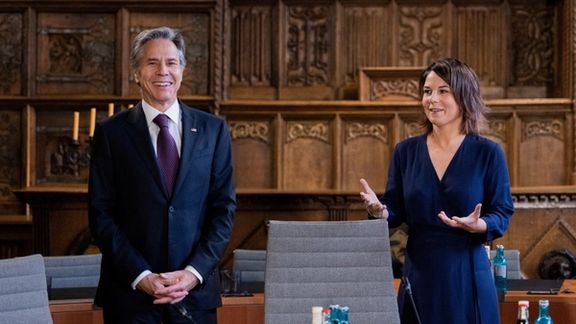US, Germany Draw Close Over Iran, Ukraine

Iran sits amid a crowded agenda at the G7 meeting in Munster, Germany, as the bloc grapples with multiple challenges centered on Ukraine.

Iran sits amid a crowded agenda at the G7 meeting in Munster, Germany, as the bloc grapples with multiple challenges centered on Ukraine.
After tensions during the Donald Trump presidency, the two-day gathering concluding Friday shows a tight relationship between the United States and Germany, currently chairing the G7 bloc that also includes Canada, France, Italy, Japan and the United Kingdom.
German foreign minister Annalena Baerbock, from Alliance 90/The Greens, has spoken out over protests in Iran since mid-September, and Thursday Berlin warned citizens in Iran to leave due to a “concrete risk of being arbitrarily arrested.” In another sign of deteriorating relations, Iran-Iraq war veterans gathered outside the German embassy in Tehran this week to highlight German firms helping Saddam Hussein with chemical weapons.
At a US-German Futures Forum Friday in Munster with Antony Blinken, Baerbock described the US Secretary of State, whom she has met ten times since taking office ten months ago, as a friend. Blinken praised as “extraordinary” the “the leadership of the German foreign minister.”
Blinken said that in setting “rules for how technology is used,” the US and Germany had to “make sure that the values we stand for…carry the day.” He noted that the “vast democratization of information technology” and highlighted recent US decisions to lift any threat of sanctions against those supplying internet-access technology to Iran.
Baerbock referred to opportunities for online education she had recently seen in Egypt, where the COP27 United Nations climate conference begins Sunday. The German foreign minister said the G7 meeting had linked information technology to “democracy and freedom,” which she said underlay Berlin’s approach to Iran.
Baerbock pledged to bring “atrocities” to UN bodies and said “democratic economic powers” needed a majority on UN human rights bodies. The US has called for Iran to be removed from the UN Commission on the Status of Women.
In recognition of recent blows to Germany and European Union expectations of trade bringing states together politically – which underlay both Russian energy supplies and the 2015 Iran nuclear agreement – Baerbock said “we have learned” this was not always true.
Tanks, jets, drones
The US and Germany, respectively the largest and second largest arms supplier to Kyiv, appear to be the same page over Ukraine. Wary of Russian escalation, both have resisted calls for advanced weapons, with Ukraine seeking Leopard 2 tanks and Marder armored infantry vehicles from Berlin, and F-16 jets from Washington.
The US and Germany, along with France and the UK, have raised the issue of Iranian-made drones at the UN Security Council, arguing that any supply contravenes the 2015 Iran nuclear agreement and justifies ‘snapback’ of UN sanctions on Tehran. Given vagaries over ‘snapback,’ and experts’ disagreements as to whether drones as relatively light weapons violate the 2015 agreement, the move may be intended to deter Iran from sending missiles.
In an interview with Dubai-based al-Arabiya published Friday, Rob Malley, the US Iran special envoy, said Iran was “embarrassed” as it had become “clear to the world” that it had “sided with Russia and its war of aggression against Ukraine.”
Domestic criticism
Further underlying US-Germany cooperation is shared experience of center-left governments facing domestic criticism. With US aid to Ukraine at $50 billion so far, House minority leader Kevin McCarthy last month ruled out a “blank check,” and some Republican candidates in November 8 Congressional elections are critical of such support for Ukraine when Americans face rising bills. In Germany opposition politicians have queried the €200 billion allocated to citizens and companies over energy price hikes due to the Ukraine war.
A further complication facing both the German-US relationship and the G7, is the rise of China. While the US has cautioned other countries over Beijing’s involvement in key sectors, German Chancellor Olaf Scholz, a Social Democrat, arrived in China Saturday seeking “economic ties as equals, with reciprocity.” Chinese-made parts in globally manufactured items may include some, alongside European and US components, in Iranian drones, the Institute for Science and International Security said in a recent report.